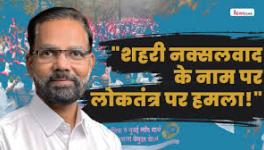A Review of "Lets Make Money"
German director Erin Wagenhofer's 2008 film, Let's Make Money, is an
in-depth examination of the global economic and financial system in
the age of neo-liberalism. Beautifully filmed, with locations from a
number of locations around the world-including Burkina Faso, Germany,
Ghana, India, Jersey, Singapore, Spain, the UK, and the US-Wagenhofer
seeks to illuminate the global economy for those of us who are kept in
the dark, and yet suffer the consequences.
Wagenhofer looks at the global financial system from a number of
different angles, each illuminating part of the problem of
neo-liberalism, which is capitalism with almost no institutional
constraint. This neo-liberalism took its current form under the
regimes of Ronald Reagan and Margaret Thatcher in the early 1980s.
Key to this was deregulation of the banking industry, attracting money
from off-shore, giving investors in particularly the UK access to
cheap capital, and which was supported by the International Monetary
Fund (IMF) and World Bank. These international financial institutions
created a four-part project known as "The Washington Consensus," which
included deregulating financial markets, liberalizing trade flows
(attacking the trade barriers developed by "developing" countries
trying to protect their economic base), breaking hold of state's power
(by reducing tax income), and then privatizing state resources through
sales to private investors; each intending to benefit the elites in
various countries around the world at the expense of "ordinary"
people.
The film is based upon interviews with investors, government
officials, and people who can provide entrée into the slums and
impoverished towns of the various countries, or a broader
understanding of what is actually taking place. Shown are the efforts
of investors to make money, and with no consideration of ethics, much
less the impact on human lives. Yet, the affects are illuminated,
such as the diversion of 97% of gold profits to the Western countries
and only 3% to Africa, despite the gold coming from Ghana, and the
gross impoverishment of the people.
Wagenhofer looks at the impact of cotton on Burkina Faso, a country in
Central Africa. Despite producing some of the world's best cotton,
and cleaned by hand, Burkina Faso cannot compete on the global market,
especially because of cotton subsidies to cotton farmers by the US
Government [as well as by the European Union-KS].
He shows the real estate bubble in Spain, and the efforts of investors
to purchase housing developments on the southern coast-with almost all
of the constructed apartments remaining vacant. Almost all have golf
courses, in a country where only a relative few play golf. These
houses are too expensive for younger Spaniards, and will remain
housing developments that are empty, while transforming the Spanish
coast and countryside for the worse, and wasting massive amounts of
water.
Also explained are the tax havens in Jersey, an island off of the UK.
A government official claims their financial services are as good if
not better than the Swiss, and brags about the investment of banks
from around the world on the island. Another government official
explains the almost total secrecy of these tax havens, and how, when
set up properly, they are almost impossible to discern who is
involved. These tax havens are the nemeses of developing countries;
it is estimated that for every $1 of development aid to Africa, $10
leaves the continent for these secretive tax havens.
For this reviewer, the highlight of the film was the section shot with
John Perkins, who served as and then wrote a book, Economic Hit Men,
about his activities as a global banker. Perkins points out that
economic hit men identify countries that have resources coveted by
large multinational corporations, such as oil, and then these hit men
convince the World Bank to loan tremendous amounts of money to these
countries, to finance huge development programs that can be carried
out by these corporations. These programs benefit only a small
minority in the country, as well as large investors in the
corporation, but leave the country with huge debts that can never be
paid back. In turn, these economic hit men return to governmental
leaders in these countries and seek "favors" by those deeply indebted,
forcing them into subservience to the United States. (Perkins
compares this process to how the Mafia operates.)
Perkins talks about his role as an "economic hit man," and says if the
bankers can't get their way, then the "jackals" (his term, but
obviously referring to the CIA) are sent in to convince or kill the
leaders, and if they still don't get their way, then the US military
is sent in. It was Perkins who ties in the CIA (and, by implication,
the "security services" of other countries) and the military to
support and protect the economic activities of global investors. Most
interestingly, however, is his discussion of Saddam Hussein's
resistance to this process, and he argues that's why Iraq was invaded.
The film, made from a European perspective, is especially interesting
because it looks at issues affecting Europe, and these are different
in some ways from the United States. There's more focus on Africa in
this film than most Americans are used to seeing-documentaries of US
origin tend to focus more on Latin America and/or East Asia (both
missing in this film, although Singapore is used as a backdrop in one
section). There is also the direct statement from a governmental
officer in Burkina Faso that if the Europeans don't end their
subsidies and let Burkina's cotton compete equally in their markets,
and after pointing out that two million people are directly employed
in Burkina's cotton industry with each supporting around 15 people, he
says that Europe will be overrun by Africans. The film also has
several segments with Hermann Scheer, a German parliament member.
Yet the European perspective misses some things that I would have
thought important to understanding the global economy. It misses the
predominant role of the US, economically and politically. It-through
Perkins-talks about how the US controls the International Monetary
Fund and the World Bank, and the United Nations, most of the time.
But other than Perkins' comments about the US military getting sent in
after the bankers and the "jackals" have failed, there is no mention
about military invasion and intervention around the world. In a film
so visually powerful, mere mention of something so important simply
seems insufficient. But, then again, it wasn't Germany who led the
invasion of Iraq or Afghanistan or ….
The film is obviously made for a European audience. It uses a series
of interviews by knowledgeable people who are quite forthcoming about
what they are doing and why. For some reason, however, these speakers
are all male, as if there are no expert female analysts. Yet, this
reviewer thinks the film would have been stronger had there been
someone or something to tie the interviews together more for the
audience: this film assumes a level of understanding that most
Americans simply don't have, even college students. Accordingly, it
will be better understood if there is someone-such as an instructor in
a "Developing Nations" or a "Global Finance" class-who can help people
watching make all of the connections made by the film.
This is an excellent film that will get audiences to raise many
provocative questions. It's clear that we must join together to
change this "system." It doesn't provide "solutions" per se, but the
information provided is excellent and well-done. It deserves wide
distribution.
Get the latest reports & analysis with people's perspective on Protests, movements & deep analytical videos, discussions of the current affairs in your Telegram app. Subscribe to NewsClick's Telegram channel & get Real-Time updates on stories, as they get published on our website.














